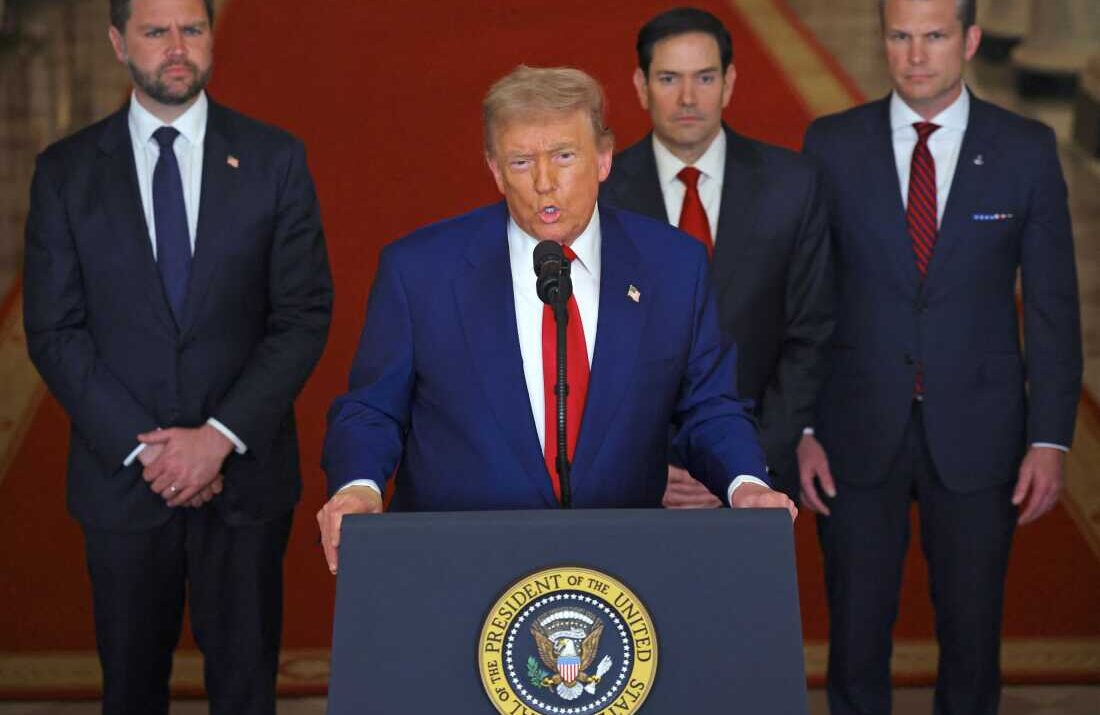“A spectacular military success” – Trump declares, as Tehran warns of “everlasting consequences” and Middle East teeters on the edge of broader war.
In a dramatic escalation of the two-week-old Israel-Iran conflict, US President Donald Trump ordered overnight airstrikes on Iran, hitting three major nuclear sites: Fordow, Natanz, and Isfahan. The strikes were carried out using B-2 stealth bombers and included deployment of a 30,000-pound “bunker buster” bomb, reportedly marking the first operational use of such a weapon.
In a televised White House address, Trump called the strikes a “spectacular military success”, warning Iran that future attacks “will be far greater” if it does not “make peace immediately.” Later, he posted “UNCONDITIONAL SURRENDER” on Truth Social.


Iran’s Response
Iran condemned the attack as a “dangerous war” and a “grave violation of international law,” demanding an emergency UN Security Council meeting. Foreign Minister Abbas Araghchi warned that the US had “blown up diplomacy” and declared Iran would respond militarily under its right to self-defense.
“They crossed a very big red line by attacking nuclear facilities… We have to respond based on our legitimate right for self-defense,” Araghchi said.
He added that “almost all” regional foreign ministers he spoke with were deeply concerned and willing to help stop Israeli aggression.
Hours after the US strikes, Iran launched missiles on Israel, hitting Tel Aviv and Haifa. At least 86 people were hospitalized, with apartment blocks reduced to rubble and civilian neighborhoods severely damaged.
Iran’s powerful hardliners have called for retaliatory missile strikes on US Navy ships and urged the closure of the Strait of Hormuz, a key global oil transit route – a move that could shock energy markets and disrupt global trade.
Israel Reacts
Israeli Prime Minister Benjamin Netanyahu praised Trump, declaring,
“Tonight, President Trump and the United States acted with a lot of strength… Peace through strength.”
Israeli Defense Forces also launched fresh strikes on western Iran, hitting missile and drone launchers and reportedly neutralizing multiple sites that had targeted Israel earlier that day.
Russia Signals Support for Iran
Russian President Vladimir Putin has “no plans” to speak to President Trump following the US strikes on Iran’s nuclear sites, the Kremlin said Sunday. However, a call could be arranged quickly if needed, according to Russia’s state news agency TASS.
While Moscow has not directly condemned the US strikes, Russia and Iran signed a strategic partnership agreement in January, reinforcing their close alliance. The pact, however, does not include mutual defense obligations.
Days earlier, Putin and Chinese President Xi Jinping held a call where both leaders condemned Israel’s attacks on Iran. In a veiled warning to Trump, Xi stressed that “major powers” should cool tensions, not escalate them.
World Leaders Call for Restraint
UK Prime Minister Keir Starmer emphasized that Iran must never obtain nuclear weapons and urged Tehran to return to talks. He stated:
“We call on Iran to reach a diplomatic solution to end this crisis.”
The UN nuclear watchdog, IAEA, confirmed it is convening an emergency board meeting but reported no rise in radiation levels near the targeted sites.
Iraq warned of a “grave threat to regional peace,” and the UN Secretary-General expressed deep concern, urging restraint.
Damage Reports and Conflicting Claims
While Trump claimed the sites were “completely obliterated,” Iranian officials insist the damage was superficial, especially at Fordow, a facility buried deep in a mountain near Qom. Satellite imagery and NASA thermal data showed heat signatures and damage near entrances, but no confirmed structural penetration of underground chambers.
Iran’s atomic agency vowed to continue the nuclear program, saying,
“We will never allow the progress of this national industry to be halted.”
What’s Next?
Analysts say Iran now faces a tough choice:
- Negotiate to save the regime and avoid total war
- Counterstrike, risking a broader US-Iran war and oil shock
- Or leave the Non-Proliferation Treaty altogether
Ayatollah Khamenei has yet to speak publicly, but his closest advisors are calling for action, suggesting a retaliatory escalation is imminent.
The US entry into the Israel-Iran conflict marks a historic and dangerous shift. With nuclear sites hit, missiles raining on Tel Aviv, and war rhetoric peaking, the world watches anxiously. A diplomatic off-ramp remains possible—but fading fast.
Disclosure: This article does not represent investment advice. The content and materials featured on this page are for educational purposes only.
Related:
Rising oil prices, inflation fears, and geopolitical volatility unsettle investors
IMF Warns: European Economy Faces Risk of Stagnation
Why Oil Prices Aren’t Surging Despite the Israel-Iran War
Trump Privately Approved Attack Plans for Iran but Has Withheld Final Order
Iran Refuses to Surrender as Trump Mulls Strike: Tensions Surge in Middle East Conflict
Trump Demands Iran’s ‘Unconditional Surrender,’ Escalates Pressure in Israel-Iran Conflict
US and UK Seal Trade Deal — but Steel Tariffs Unresolved
Trump Exits G7 Early as Leaders Urge Mideast Ceasefire: What the Summit Delivered
OpenAI considers antitrust action against Microsoft amid tensions










